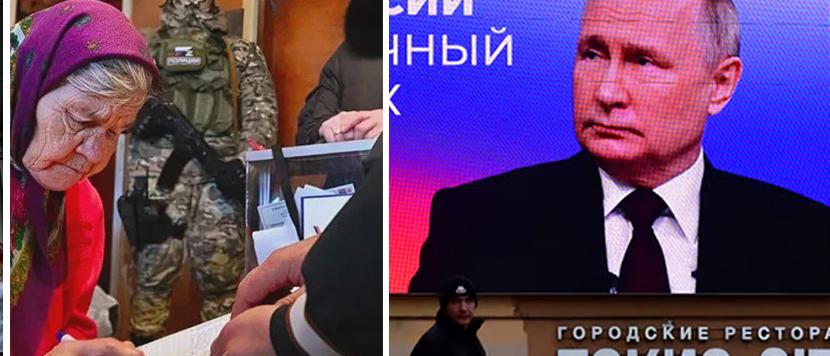unsaveSave
Election workers and police go from house to house with ballot boxes – and automatic rifles.
In the occupied territories of Ukraine, the inhabitants are forced to vote for Vladimir Putin.
– This is not democracy. It’s a comedy show, an anonymous resident of Kherson told BBC.
ⓘ The summary is made with the support of AI tools from OpenAI and quality assured by Aftonbladet. Read our AI policy here.
Show more
chevron-down
On Friday, the Russian presidential election began, which lasts for three days.
Observers call it rigged, a mock election, where the aim is for Vladimir Putin to be elected as the country’s leader for the fifth time.
On the ballot there are four candidates to tick off. But none of the other three is a realistic alternative. There is no strong political opposition – they are either imprisoned, dead or in exile.
But there are those who resist. Several people have been arrested for vandalizing polling stations during the first day of the election, Russian authorities say.
Calls for protest
Among other things, people have tried to destroy ballot boxes by pouring green paint into them or lighting them on fire. Fireworks are said to have been set off inside polling stations.
Meanwhile, Yulia Navalnaya, the wife of dead opposition leader Alexei Navalny, has called on regime critics to protest at polling stations on Sunday.
New for this time is that the elections are also being held in the illegally occupied parts of the Ukrainian regions of Kherson, Donetsk, Luhansk and Zaporizhzhya.
Here, a high voter turnout is seen as particularly important – to mark control, silence dissent and present Putin as a legitimate leader.
expand-left
full screen
chevron-rightnext
In occupied parts of Ukraine, some voters are reported to be voting at gunpoint.
1 / 2Photo: TT
“Coming to your house”
Voting began earlier this week in the occupied regions, “for security reasons”, write BBC.
Temporary polling stations have been set up and are monitored by soldiers or police. But residents don’t even have to go there, as officials with ballot boxes have been sent to people’s homes.
“Dear voters, we are concerned about your safety! You don’t need to go anywhere to vote – we will come to your home with ballots and ballot boxes,” the Russian-installed election commission in Zaporizhzhya wrote on social media.
It is called a voting campaign that is there to inform residents about the election process. But according to the BBC, election workers collect personal data and sometimes make home visits. Reports have come in of people being forced to vote at gunpoint, write AP.
Free concerts and food have also been used to attract people to the polling stations, and the Kremlin has painted early voting as a successful public celebration.
expand-left
full screen
chevron-rightnext
Putin voted electronically in the election on Friday.
1 / 2Photo: Pavel Byrkin / AP
“Very scared”
The Ukrainian mayor of the Russian-occupied city of Mariupol tells AP that “a woman surrounded by two Chechen soldiers with assault rifles” showed up at his neighbor’s house with a ballot box and made it clear that voting is not voluntary.
Even the Ukrainian governor of Zaporizhzhya testifies that residents were intimidated into voting:
– Our citizens are very afraid. If Russians with soldiers come to their apartment and ask if they want to vote for Putin, of course everyone will say: Okay, yes. Because everyone wants to save their lives. But that does not mean that our citizens want to support Putin, he told the BBC.
According to AP, there are also reports that Russian authorities have threatened residents with withdrawn healthcare and benefits. Several dozen Ukrainians who refused to vote have been arrested, according to human rights groups.
